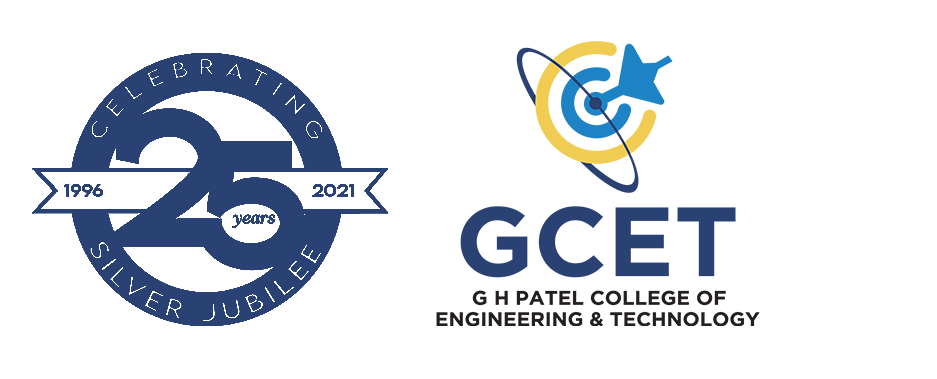Information Technology deals with the gamut of Electronic Technology and software which can be used to transmit, receive, store and process information in digital form. Sustained developments in the area have made it possible to process information at speeds which were thought impossible few years ago. GCET was the pioneer in India to appreciate the importance of Information Technology and established a four year bachelor degree program in 1996-97 with an intake of 60 students. Department started post graduate course ME in Information Technology program under Gujarat Technological University (GTU) from the academic year 2011-12. From academic year 2020-21, the GCET is now one of the constituent colleges of CVM University. Department offers a B.Tech program in Computer Science and Engineering (IoT) with an intake of 60 students from the academic year 2021-22. The Undergraduate program in the Department of Information Technology has been accredited by National Board of Accreditation since July 2015 for two years.
The Department has state-of-art laboratories with latest configuration PCs and required software, to run the experiments as prescribed in the curriculum. The Department has also signed MoU with industry to stay in touch with ongoing technologies in the domain of Information Technology. The Department organizes Expert Talk, Seminar, Workshop and Short Term Training Program (STTP) by calling the distinguished experts from the industry and reputed institutes across the country for grooming the students with cutting edge knowledge along with their regular study. The Department has organized one National and Three International Conferences in the domain of Information Technology.
Many renowned alumni of the department are either holding respectable position in industries like Infosys, Wipro, IBM, Intel, Capegemini, Microsoft, Tech Mahindra etc. or have opted for higher studies across the globe. Students of the department with the help of faculty members have developed user friendly software such as Online Feedback system, Library system and GCET Information System (GIS). The faculty members and students are also involved in Research and Development Activity.
To impart quality education in Information Technology and enable learners to cope with global challenges to build professional career benefitting the sustainable growth of an individual and the society at large.
- To propose state of the art educational environment equipped with cutting edge technology in the area of Information Technology.
- To facilitate learners and faculties with every single opportunity of professional progression embedded in academic scenario itself which can cause enriched workforce contributing to the development of the nation.
- To fulfill the noble cause of educating budding technocrats by accelerating the momentum of research and implementing innovative inputs in teaching-learning.
Programme Educational Objectives
- To acquire knowledge of core area of engineering and suitable prerequisites through modern tools and techniques along with enhancing soft skills and continuing professional development.
- To identify real life problems through proper investigation and to design and develop appropriate solution through systematic analysis which is economically feasible and in accordance with the need of industry, academia and society at large.
- To exhibit the professional growth as an individual and a team as well; along with ethical responsibility and approach of lifelong learning.
Programme Outcomes
- Engineering knowledge: Apply the knowledge of mathematics, science, engineering fundamentals, and an engineering specialization to the solution of complex engineering problems.
- Problem analysis: Identify, formulate, review research literature, and analyse complex engineering problems reaching substantiated conclusions using first principles of mathematics, natural sciences, and engineering sciences.
- Design/development of solutions: Design solutions for complex engineering problems and design system components or processes that meet the specified needs with appropriate consideration for the public health and safety, and the cultural, societal, and environmental considerations.
- Conduct investigations of complex problems: Use research-based knowledge and research methods including design of experiments, analysis and interpretation of data, and synthesis of the information to provide valid conclusions.
- Modern tool usage: Create, select, and apply appropriate techniques, resources, and modern engineering and IT tools including prediction and modelling to complex engineering activities with an understanding of the limitations.
- The engineer and society: Apply reasoning informed by the contextual knowledge to assess societal, health, safety, legal and cultural issues and the consequent responsibilities relevant to the professional engineering practice.
- Environment and sustainability: Understand the impact of the professional engineering solutions in societal and environmental contexts, and demonstrate the knowledge of, and need for sustainable development.
- Ethics: Apply ethical principles and commit to professional ethics and responsibilities and norms of the engineering practice.
- Individual and teamwork: Function effectively as an individual, and as a member or leader in diverse teams, and in multidisciplinary settings.
- Communication: Communicate effectively on complex engineering activities with the engineering community and with society at large, such as, being able to comprehend and write effective reports and design documentation, make effective presentations, and give and receive clear instructions.
- Project management and finance: Demonstrate knowledge and understanding of the engineering and management principles and apply these to one's own work, as a member and leader in a team, to manage projects and in multidisciplinary environments.
- Life-long learning: Recognize the need for and have the preparation and ability to engage in independent and life-long learning in the broadest context of technological change.
Programme Specific Outcomes
- An ability to recognize and analyze the problems being faced in the society, and design and implement the suitable solution with sound technical knowledge.
- An ability to develop an efficient application using the knowledge of programming, web technology, storage, mathematics, networking and contemporary technologies in the domain of IT.
-
SELECT description FROM depthome where dept_id like 'UGIT' and category='PSO'
- An ability to recognize and analyze the problems being faced in the society, and design and implement the suitable solution with sound technical knowledge.
- An ability to develop an efficient application using the knowledge of programming, web technology, storage, mathematics, networking and contemporary technologies in the domain of IT.

